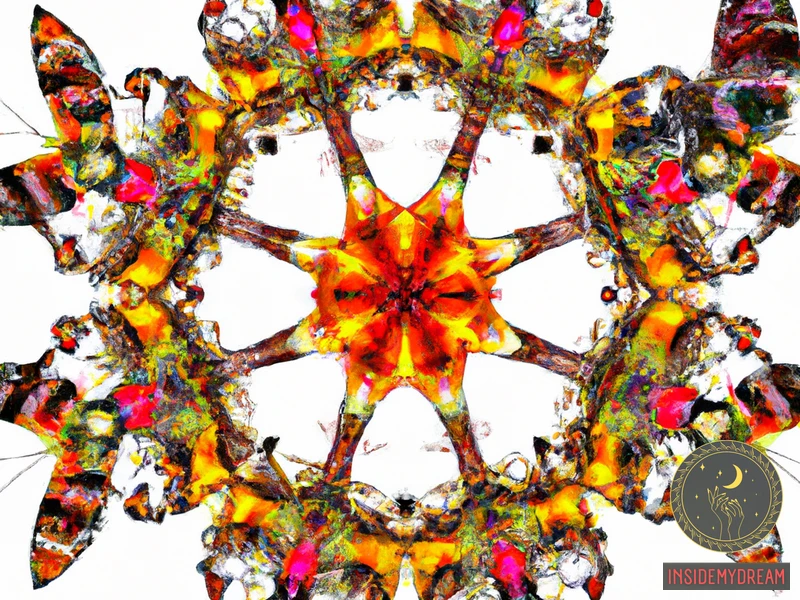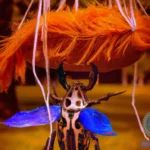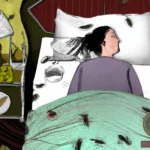Have you ever had a dream about bugs? Whether it’s a swarm of insects, a solitary spider, or a creepy-crawly centipede, dreams about bugs can be unsettling. Many people believe that dreams about bugs have significant meanings, often related to our subconscious thoughts and emotions. In this article, we’ll explore the various interpretations of bug dreams and what they might reveal about our inner psyche.
The Symbolism of Bugs in Dreams

Bugs are often associated with feelings of disgust and discomfort in waking life. When they appear in dreams, they can symbolize similar emotions or experiences that are causing unease or anxiety. The specific type of bug and the context in which it appears can provide valuable insights into the dream’s meaning.
Common Bug Dream Symbols
Dreams about spiders may represent feelings of entrapment or manipulation, as spiders are often associated with weaving intricate webs. Ants in dreams might symbolize feelings of being overwhelmed or a need for organization and discipline. Meanwhile, dreams about bees could indicate a need for cooperation and community, as bees are known for their highly organized social structure.
Interpreting Bug Dreams
Interpreting bug dreams requires careful consideration of the dreamer’s emotions and the specific details of the dream. For example, if the dreamer feels fearful and anxious about the bugs in the dream, it may suggest underlying fears or anxieties in their waking life. On the other hand, if the bugs in the dream are harmless and non-threatening, it could symbolize a need for resilience and adaptability.
Psychological Perspectives
From a psychological standpoint, bug dreams may be linked to the dreamer’s subconscious thoughts and emotions. Sigmund Freud, the famous psychoanalyst, believed that dreams were a window into the unconscious mind, and that the presence of bugs in dreams could symbolize repressed desires or unresolved conflicts. Similarly, Carl Jung, another influential figure in psychology, viewed bugs in dreams as representations of the shadow self – the darker, hidden aspects of the psyche that are often overlooked.
Common Themes in Bug Dreams

While the specific details of bug dreams can vary widely, there are several common themes that often appear in these types of dreams. Understanding these themes can provide valuable insights into the underlying meanings of bug dreams.
Fear and Anxiety
One of the most prevalent themes in bug dreams is fear and anxiety. Many people feel a sense of dread or discomfort when encountering insects or other creepy-crawlies, and these feelings can manifest in dreams as well. The presence of bugs in dreams may reflect the dreamer’s worries and anxieties in their waking life, serving as a symbolic representation of their inner fears.
Feeling Overwhelmed
Dreams about swarms of bugs or an infestation in the home can symbolize a sense of being overwhelmed or inundated. This could represent the dreamer’s feeling of being unable to cope with the demands and challenges in their life. The dream may be a signal to take a step back and reassess the situation, finding ways to regain control and manage the stressors.
Transformation and Change
In some cases, bugs in dreams can symbolize transformation and change. For example, dreams about caterpillars transforming into butterflies might represent the dreamer’s own process of growth and personal development. Similarly, dreams about bees and their hive could signify the importance of community and collaboration in the dreamer’s life.
Exploring Cultural and Spiritual Meanings
In addition to psychological interpretations, bug dreams can also carry cultural and spiritual significance. Many cultures around the world have unique beliefs and superstitions regarding insects, and these beliefs can influence the way bug dreams are interpreted.
Symbolism in Different Cultures
In some cultures, certain bugs are revered and associated with positive attributes. For example, in many Asian cultures, the dragonfly is seen as a symbol of transformation and renewal. In contrast, Western cultures often view cockroaches as symbols of filth and decay. These cultural associations can affect the interpretation of bug dreams, depending on the dreamer’s cultural background and beliefs.
Spiritual Interpretations
From a spiritual perspective, bugs in dreams can be seen as messengers or symbols from the divine. Some spiritual traditions believe that insects carry powerful messages and can offer guidance to the dreamer. For example, a dream about a butterfly might be interpreted as a sign of spiritual growth and enlightenment, while a dream about a spider could symbolize the need to confront fears and embrace inner strength.
Coping with Bug Dreams
For many people, bug dreams can be distressing and unsettling. If you find yourself experiencing recurring bug dreams or feeling disturbed by the presence of insects in your dreams, there are several strategies you can use to cope with these experiences.
Journaling and Reflection
Keeping a dream journal can be a helpful way to track recurring bug dreams and identify any patterns or common themes. By reflecting on your dreams and exploring the emotions they evoke, you may gain valuable insights into the underlying causes of your bug dreams.
Seeking Support
If bug dreams are causing significant distress or anxiety, it may be beneficial to seek support from a mental health professional. A therapist or counselor can help you explore the root causes of your dreams and develop coping strategies to manage any underlying stress or anxiety.
Exploring Symbolism
Taking the time to explore the symbolism of bugs in dreams can offer a new perspective on these experiences. By learning about the various interpretations of bug dreams and considering how they might relate to your own life, you may find ways to reframe your dreams in a more positive light.
Curious about the meaning of bug dreams? Explore our articles on pug dream meanings, rug dream meanings, and big dream meanings for more insights into the intriguing world of dream interpretation!
Conclusion
Dreams about bugs can be perplexing and often provoke strong emotional responses. By delving into the symbolism and interpretations of bug dreams, we can gain valuable insights into our subconscious thoughts and emotions. Whether they represent fears, transformation, or cultural symbolism, bug dreams offer a unique window into the complexities of the human psyche. By exploring and understanding these dreams, we can gain a deeper understanding of ourselves and the inner workings of our minds.









